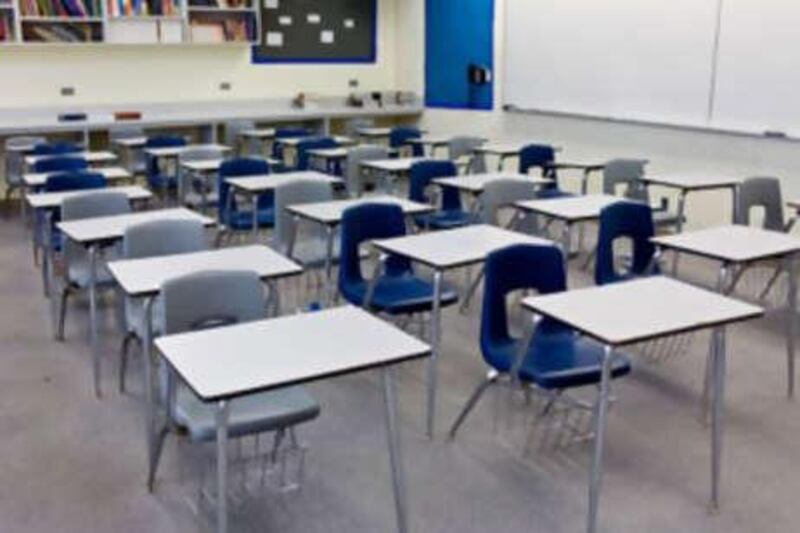ABU DHABI // All grade 10 pupils at government-run schools will have to sit compulsory new Arabic language exams from the beginning of the next academic year, the Ministry of Education has confirmed. The exams - the Arabic equivalent of the Test of English As a Foreign Language (Toefl) examinations used worldwide - are not expected to apply to expatriates in private schools. However, Sheikha Khulood Al Qasimi, the director of the curriculum department at the Ministry of Education, did not rule out the possibility that the proficiency exams might be extended to all schools in the future.
Arabic lessons are compulsory in all schools, but examinations in the language are not. Sheikha Khulood said the exams would cover spoken and written Arabic and would be taken by pupils in Grade 10 from September. "The specific exam we will use has not yet been decided; we are studying different models from different companies and will probably approve one by the end of this month," she said. "At the moment, our students take an exam to test their proficiency in English before they go to university, but until now there has not been a requirement to test their Arabic."
Dr Mohammed al Hannash, an Arabic language professor at the Canadian University of Dubai, is the project manager for one of the new exam systems being considered by the Ministry of Education. He said he would welcome the exams being made compulsory for native and non-native Arabic speakers "Even the teachers will be required to sit an exam at a special level," he said. Pupils attending state schools face the prospect of being held back for a year if they fail the test. Private pupils would face the same fate if the scheme was extended to independent schools.
An official at the Knowledge and Human Development Authority (KHDA) in Dubai, who asked not to be named, confirmed that pupils in state schools could theoretically remain in secondary school until the age of 20 if they were kept back repeatedly. Directives from the ministry regarding the new exams had not yet been sent to the KHDA, he said. The exams will be tested on a sample of about 150 students around the country in September. The rest of the nation's pupils would sit the test by the end of the school year, he said.
Dr Hanif Hassan, the Minister of Education, said the development of Arabic in schools was one of the main goals of the ministry's National Curriculum Committee, which was seeking to provide a modern education that would be "the cornerstone of human development and progress of the nation". "Developing young, talented, qualified nationals cannot be achieved without providing an effective and positive education that fulfils the requirements of the labour market," he said.
He said plans were also being developed for a new curriculum in Islamic and cultural studies, which would help to place the historical aspects of the religion in a modern context. "For example, the new curriculum presents the Prophet Mohammed as a model and example for the new generation, with special emphasis on his role as a father, husband, merchant and prophet," he said. "The new curriculum also presents new topics that coincide with the modern trends of life and the right image of Islam; such a curriculum suits the needs of Muslims all over the world."
@Email:gmcclenaghan@thenational.ae






